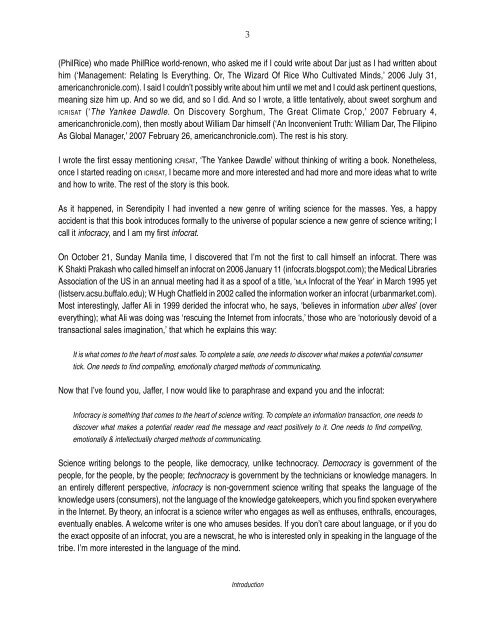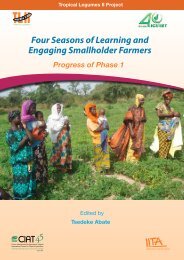Download - icrisat
Download - icrisat
Download - icrisat
Create successful ePaper yourself
Turn your PDF publications into a flip-book with our unique Google optimized e-Paper software.
3<br />
(PhilRice) who made PhilRice world-renown, who asked me if I could write about Dar just as I had written about<br />
him (‘Management: Relating Is Everything. Or, The Wizard Of Rice Who Cultivated Minds,’ 2006 July 31,<br />
americanchronicle.com). I said I couldn’t possibly write about him until we met and I could ask pertinent questions,<br />
meaning size him up. And so we did, and so I did. And so I wrote, a little tentatively, about sweet sorghum and<br />
ICRISAT (‘The Yankee Dawdle. On Discovery Sorghum, The Great Climate Crop,’ 2007 February 4,<br />
americanchronicle.com), then mostly about William Dar himself (‘An Inconvenient Truth: William Dar, The Filipino<br />
As Global Manager,’ 2007 February 26, americanchronicle.com). The rest is his story.<br />
I wrote the first essay mentioning ICRISAT, ‘The Yankee Dawdle’ without thinking of writing a book. Nonetheless,<br />
once I started reading on ICRISAT, I became more and more interested and had more and more ideas what to write<br />
and how to write. The rest of the story is this book.<br />
As it happened, in Serendipity I had invented a new genre of writing science for the masses. Yes, a happy<br />
accident is that this book introduces formally to the universe of popular science a new genre of science writing; I<br />
call it infocracy, and I am my first infocrat.<br />
On October 21, Sunday Manila time, I discovered that I’m not the first to call himself an infocrat. There was<br />
K Shakti Prakash who called himself an infocrat on 2006 January 11 (infocrats.blogspot.com); the Medical Libraries<br />
Association of the US in an annual meeting had it as a spoof of a title, ‘MLA Infocrat of the Year’ in March 1995 yet<br />
(listserv.acsu.buffalo.edu); W Hugh Chatfield in 2002 called the information worker an infocrat (urbanmarket.com).<br />
Most interestingly, Jaffer Ali in 1999 derided the infocrat who, he says, ‘believes in information uber alles’ (over<br />
everything); what Ali was doing was ‘rescuing the Internet from infocrats,’ those who are ‘notoriously devoid of a<br />
transactional sales imagination,’ that which he explains this way:<br />
It is what comes to the heart of most sales. To complete a sale, one needs to discover what makes a potential consumer<br />
tick. One needs to find compelling, emotionally charged methods of communicating.<br />
Now that I’ve found you, Jaffer, I now would like to paraphrase and expand you and the infocrat:<br />
Infocracy is something that comes to the heart of science writing. To complete an information transaction, one needs to<br />
discover what makes a potential reader read the message and react positively to it. One needs to find compelling,<br />
emotionally & intellectually charged methods of communicating.<br />
Science writing belongs to the people, like democracy, unlike technocracy. Democracy is government of the<br />
people, for the people, by the people; technocracy is government by the technicians or knowledge managers. In<br />
an entirely different perspective, infocracy is non-government science writing that speaks the language of the<br />
knowledge users (consumers), not the language of the knowledge gatekeepers, which you find spoken everywhere<br />
in the Internet. By theory, an infocrat is a science writer who engages as well as enthuses, enthralls, encourages,<br />
eventually enables. A welcome writer is one who amuses besides. If you don’t care about language, or if you do<br />
the exact opposite of an infocrat, you are a newscrat, he who is interested only in speaking in the language of the<br />
tribe. I’m more interested in the language of the mind.<br />
Introduction

















